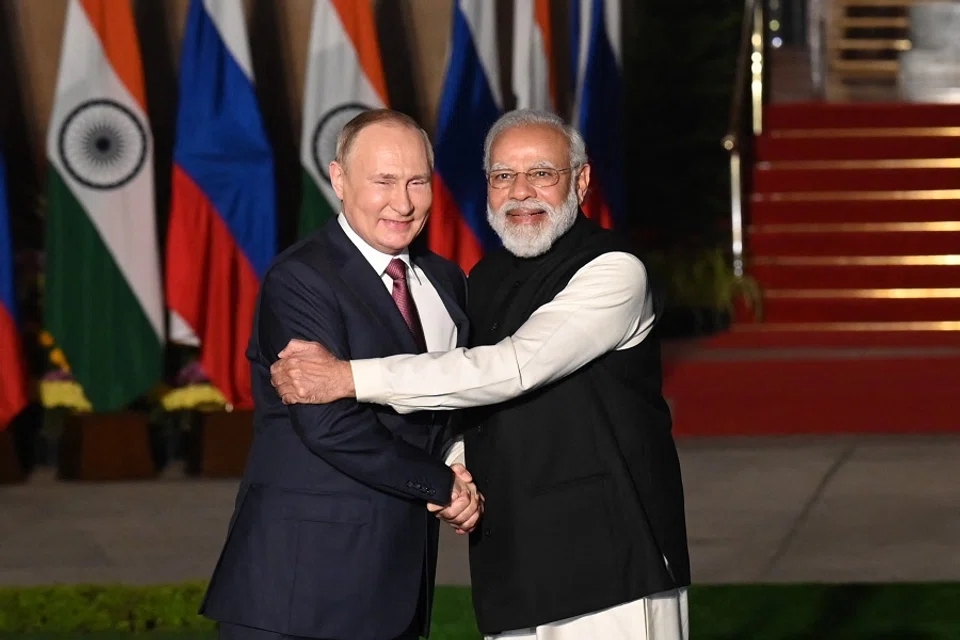India and Russia remain on opposite sides of the Indo-Pacific's balance of power
Russian President Vladimir Putin's recent visit to New Delhi should be seen as one of correcting the downward slide in India-Russia relations rather than a celebration of an age-old strategic partnership, says Yogesh Joshi. Against the backdrop of a rising China, India feels the threat of strengthening Russia-China relations and the latter's engagement of Pakistan and Afghanistan. Meanwhile, India-US relations have taken on greater strategic significance, and Russia may be wary of India's involvement in the Quad. With divergent national interests and threat perceptions likely to continue, will it be harder for both powers to find themselves on the same side?

Russian President Vladimir Putin travelled to New Delhi for a summit-level meeting with Indian Prime Minister Narendra Modi in the first week of December 2021. The joint statement issued after the meeting reaffirmed the "special and privileged strategic partnership" between the two countries. The two sides signed several bilateral agreements, including a deal to produce AK-203 rifles in India jointly worth nearly US$700 million. Earlier this year, India signed a US$3 billion lease of an Akula-class nuclear submarine. Putin's visit came on the heels of announcements by the Russian state arms exporter Rosoboronexport of delivering the first batch of S-400 missile defence systems to the Indian military. India had signed the deal to purchase five battalions of the S-400 missile defence platforms from Russia at a whopping cost of US$5 billion in 2018.
...of late, significant divergence is visible in the India-Russia relationship.
From strong defence win-wins to robust diplomatic ties
During the Cold War, New Delhi looked upon Moscow as its great power friend. Even in the post-Cold War period, when the relationship lost much of its historical and emotional sheen, pragmatism dictated a confluence of interest between the two erstwhile strategic allies. Given India's historical military relationship with Russia and the lineage of Russian equipment in India's military, India's military dependence on Moscow continued. Yet, India also started diversifying its military procurement by sourcing equipment from Western countries, particularly from the US, Israel and France. Such diversification provided India with alternative sources of military hardware and provided her a lever to extract better deals from Moscow. Where Western sources hesitated, India turned towards Moscow to develop hypersonic cruise missiles such as Brahmos and lease of nuclear submarines. Also, Russia found the Indian connection extremely profitable as it brought hard-earned cash to Moscow's decrepit arms industry.
The special military relationship between the two countries also resulted in robust diplomatic cooperation. India needed Russia's support on Kashmir, its bid for the permanent seat of the United Nations Security Council (UNSC) and the Nuclear Suppliers Group. Moscow, too, saw India's vital pitch for a multipolar world order. Support or silence from the world's largest democracy was also valuable to ride over the criticisms for Putin's domestic excesses within Russia and its confrontational approach in Russia near abroad. Russia's foreign policy required a non-aligned, strategically autonomous India.
Many in New Delhi also suspect Moscow's hands in keeping India out of the final negotiations over the Afghanistan issue.

for New Delhi, Moscow's worsening relations with the West and its emerging entente with Beijing is the most serious problem.
Trouble in the Russia-India relationship
However, of late, significant divergence is visible in the India-Russia relationship. Though India has opted out of Moscow's invitation to participate in the joint production of a fifth-generation fighter jet programme, the military relationship remains on an even keel. The problem is the burgeoning dissonance at the diplomatic level. In 2019, to India's surprise, Moscow supported the Chinese request to discuss the Kashmir issue in the United Nations Security Council (UNSC) after the Modi government had revoked the autonomy of the restive Himalayan province. Moscow has also increased its diplomatic contact with Pakistan, but the military engagement between the two has left New Delhi wondering about Russia's intent. Joint military exercises between Russian and Pakistani armed forces have become a regular affair. Many in New Delhi also suspect Moscow's hands in keeping India out of the final negotiations over the Afghanistan issue. And most importantly, Moscow has decried India's greater engagement with the Quadrilateral Security Dialogue or Quad. Russia believes that the Quad supports a greater US presence in the Indo-Pacific region and constitutes a threat to Russian interests.
However, for New Delhi, Moscow's worsening relations with the West and its emerging entente with Beijing is the most serious problem. The West, particularly the US, has turned decisively anti-Putin in light of the 2014 Ukrainian crisis and the reports of Russian interference in the 2016 US presidential elections. The ensuing economic sanctions endanger the India-US strategic partnership, including the US Congress-sanctioned Countering American Adversaries Through Sanctions Act (CAATSA). Though New Delhi is hopeful that Washington will provide relief from CAATSA, the general slide in US-Russia relations has become a severe headache for Indian diplomacy.

Western belligerence, as Putin perceives it, has forced Moscow to embrace China as a junior partner. For New Delhi, the alignment of continental Eurasian powers such as China, Russia and Pakistan against Indo-Pacific maritime democracies does not augur well for Indian interests. Historically, India's China strategy has benefited immensely from an independent Moscow. Moscow's subservience to Beijing has severe military ramifications as it allows greater transfer of Russian military technology to China and allows China to influence Russian diplomacy against India's interests. Some have argued that Russia deliberately delayed the shipment of S-400 systems in 2020 because of pressure from Beijing in the wake of the Sino-Indian border crisis.
The emerging hegemonic clash between US and China has forced the Cold War strategic partners into two separate camps.
The diplomatic dissonance resulting from the diverging national interests of the two countries resulted in the canceling of their annual dialogue in December 2020. Therefore, Putin's recent visit must be seen to correct the downward slide in the India-Russia relations rather than as a celebration of their age-old strategic partnership. Even when the increasing conflict with the West has forced Putin to embrace Chinese power, Russia remains wary of sliding too far into the Chinese orbit, given the Sino-Russian differences over Central Asia and Russia's Far East. India also understands the need to keep Moscow in good humour, as a tight alliance between Russia and China may be New Delhi's worst nightmare.

However, the overall trajectory of the India-Russia relationship cannot be divorced from the more significant undercurrents of international politics. The emerging hegemonic clash between US and China has forced the Cold War strategic partners into two separate camps. Russian national interests are motivated by the fear of Western democracies such as the US; its foreign policy has found an opportunistic partner in other continental autocracies such as China. China drives India's territorial and status insecurity; US hegemony in the Indo-Pacific is New Delhi's best bet for balancing Beijing's rising power. Therefore, irrespective of Putin and Modi's attempt at reconciliation, the rise for India-Russia relations is bound to get bumpy.





![[Photos] Fact versus fiction: The portrayal of WWII anti-Japanese martyrs in Taiwan](https://cassette.sphdigital.com.sg/image/thinkchina/3494f8bd481870f7c65b881fd21a3fd733f573f23232376e39c532a2c7593cbc)